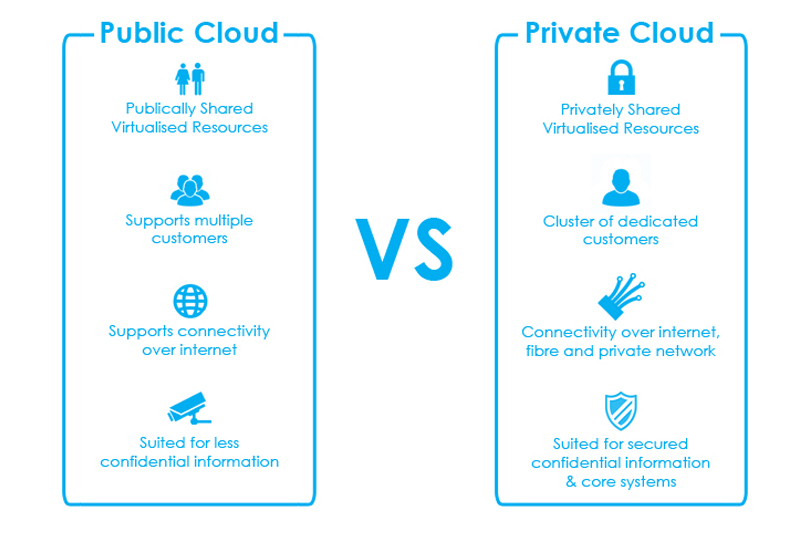Businesses handle lots of data, but often have limitations when it comes to storage and performance on localized platforms. Cloud services, on the other hand, offer businesses virtually unlimited space to operate which provides scaling businesses with an edge when their infrastructure needs rapid improvement. Businesses achieve this rapid cloud deployment through two different methods with similar goals. Which one is right for your business?
Public Cloud vs Private Cloud
- Public cloud is used when security and compliance are not immediate concerns for organizations or customers. The situation is different in private cloud computing where all hardware, network, and storage are privately held and managed.
- The public cloud is a shared environment where different clients can buy and manage server slices online at any time. You control the level of security, the setup, and the operation of your servers and network. Things are much different with a private cloud where a privately held business manages the entire environment. They provide experienced configurations and can administer the security and the network.
- Compliance with requirements like PCI (Payment Card Industry) or SOX (Sarbanes-Oxley) is easier on a private cloud as settings are customized to the client. Public clouds are a utility service on which things are shared, making compliance more difficult.
- It is possible to customize your environment specifications and performance on a private cloud as opposed to the public alternative where you have no say about their methods.
- Public clouds are an ideal choice for those looking to save some cash in exchange for time and energy in setting up and maintaining the public infrastructure. With a private cloud, you have the knowledge and experience of the company behind the private network to assist with migrations, setup, and maintenance of your system.
- You can’t be choosy on a public cloud where the service provider chooses which hardware or network to place your virtual server. This unlike a private cloud where you have the options on hardware, storage performance or cache.
- The private cloud is more secure than its public counterpart for obvious reasons. Private organizations can control access on their personal servers unlike in the public environment where it is difficult to prevent unauthorized access by other clients. Some service providers will wall off your data in a public cloud to bring some privacy to this environment. This keeps your data from mixing with that of other companies without increasing the costs of cloud computing.
Now that you understand what private and public cloud have to offer, it is important to make the right choice. Some organizations are suited for the public cloud while others have better chances of survival if they go private. Whichever option you pick, remember that the provider ultimately shapes the solutions. Small companies can use the public cloud as long as their security needs are addressed. Instead of relying wholly on the service provider for security, take the necessary steps yourself to benefit from a public cloud without compromising network and data safety. Companies that exchange large amounts of privileged information are better off on the private cloud where there are fewer chances of a breach.
If you seek more control over what you put in the cloud, consider using a dedicated private cloud instance. You can customize your virtual servers hardware, storage, and other factors to align the service to your business needs. Service providers will handle the aesthetics and security to ensure that your data is safe, and you don’t have to pay for services that you haven’t used.
If you are not conversant with the cloud, take your time to find a professional who will guide you through. The right expert will analyze your business in order to determine the best cloud service for you. It is advisable to seek professional help before choosing a private vs. public cloud, but you should remember that you can always switch between platforms as the need arises. If you just can’t choose between private and public cloud, there is a middle ground that allows you to benefit from aspects of both public and private cloud. With hybrid cloud computing, you will be able to prevent intrusion and enable the recovery of different environments. This option also allows you to tailor virtual environments by separating private applications from public ones and this will address this in depth in another blog post.
Read more on the benefits and comparisons of the different cloud models.


